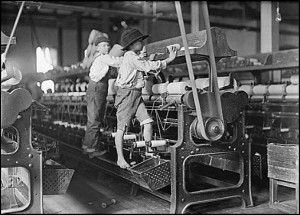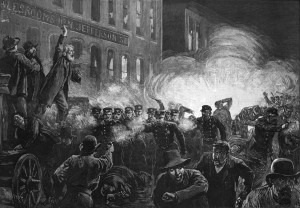Monday, September 7, 2015
Today Americans celebrate Labor Day as a three-day weekend that officially marks the end of summer vacations, touches off a flurry of back-to-school sales, and brings families together for a barbeque. But the origin of this holiday that celebrates American workers is rooted in a long, difficult, and bloody struggle for basic worker rights.
During the Industrial Revolution thousands of men, women, and children as young as five years old, found work in textile mills, factories, and mines. They worked 12-hour days, seven days a week, for minimal pay. Working conditions were generally unsafe, unsanitary, and unhealthy. In the late 19th century workers began to organize and demand better pay and improved work environments. On September 5, 1882, 10,000 workers assembled for the first Labor Day Parade. They sacrificed their wages that day to march from City Hall to Union Square in New York City. Protest rallies evolved into strikes to force employers to the bargaining table and strikes became increasingly violent. During the Haymarket Riot of 1886 several Chicago police officers and protesters were killed.
Oregon was the first state to approve legislation that established Labor Day observances in 1887. By 1894 another twenty-seven states had passed similar bills. On June 28, 1894, Congress approved legislation that established the first Monday of September as a legal holiday in the District of Columbia and the territories to celebrate the American workforce. Glover Cleveland signed the legislation into law.
Photos:
Child laborers in the 1800s
Engraving of the Haymarket Riot
Sources
https://www.dol.gov/laborday/history.htm
https://www.nydailynews.com/news/national/history-labor-day-forgotten-article-1.1923299
https://huffingtonpost.com/2014/09/01/labor-day-2014_n_5738262.html
To commemorate the City of Troy’s 60th Anniversary in 2015, we will publish a different story each day that highlights a person, discovery, or event that occurred locally, regionally, nationally, or even globally between 1955 and 2015 and that helped shape our lives and our community. We will try to post stories on important anniversary dates, but we also realize that dates are less critical than content and context. We will include the facts related to controversial stories, allowing our readers to form their own opinions. We invite you to read and comment on the stories. Your suggestions for topics are also welcome and can be posted on our Facebook page, www.facebook.com/TroyHistoricVillage. You can also email stories or ideas to the 365 Story Editor at ed@thvmail.org.








